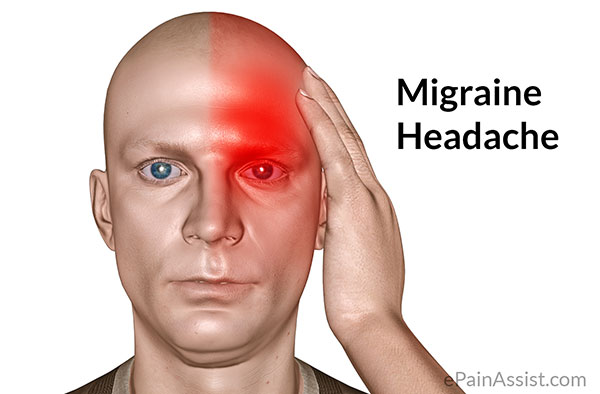Migraines, they are a literal pain in the head. Almost 5 millions Americans experience the burden of a migraine at least once a month. What exactly are they, and what causes them? Migraines are severe headaches that cause throbbing in one particular area of the head. Symptoms that come along with these vicious headaches include nausea and sensitivity to light, these symptoms may vary in intensity depending on the person. Although researchers are not completely certain on what causes migraines, many believe migraines involve complications with brain chemicals and nerve pathways. Omitting the past belief that migraines are caused by constricted blood vessels in the head, The Migraine Research Foundation has stated that they believe migraines are a collection of severe neauroligical symptoms as well as the fact that they are confident that there is more they can do for the victims of migraines.
Migraine Diagnosis
Migraines are usually self-diagnosiable, but for others who can not diagnose themselves, doctors can run blood tests as well as MRI or CT scans to further explore the issue. Once a patient is diagnosed with migraines, they are offered a wide variety of treatment options such as pain relievers and caffeine combination drugs. Although these treatments may not completely omit the pain of migraines or the chances of getting another one, it does lower the risks. Patients can also try just simply relaxing and trying to get a full eight hours of sleep every night. Home remedies that may help reduce the pain of migraines include natural oils such as peppermint oil and basil oil. Peppermint oil helps open and close vessels, as many migraines are often caused by poor blood flow. Basil oil is a natural muscle relaxant, so it aids in relaxing tight muscles in the head.
Who Gets Migraines?
Migraines are unfortunately heredity, so it is important for families to know how to manage their migraines, if it does happen to be in their genes.If either parent gets migraines there is a 50-75% chance that their child will as well. Families may be able to target who inherited the migraine gene by talking about family member’s past history with migraines. Understanding how others helped ease the pain of their migraines, may aid victims for their future head aches. This may also help victims be alert and aware as to what triggers these severe head aches as well as what symptoms come along with them. Those living with the trouble of migraine are also encouraged the keep a headache diary that includes triggers and symptoms along with the consistency of their migraines.
Personal Experiences with Migraines
I personally have had many traumatic experiences with migraines. My attacks would last about a week and gradually get worse day by day until it was so excruciating that I could not leave my bed. I would have to put up black out curtains in my room and stuff my head inside my pillows. Even the slightest noise or shining lights brought so much pain to me that even thought of standing up upset my stomach. I could not eat for my stomach was so nauseated, and even if I attempted to, I would just throw my food back up. One of the things that helped me during this times was BC powder, a powder formula that contains 845 mg of aspirin and 65 mg of caffeine. Although it took me a long time to discover this wonderous powder, I was very glad that I did. The pain from a migraine can justifiably be bad enough to drive someone to take heavy drugs and end up in a rehab. This seemed to be the only thing that could ease the pain of my headaches. Although this worked for me personally, this may not be the best option for other migraine victims. Many people prefer more natural treatments such as massage therapy or natural oils as I mentioned earlier. Another effective option is increasing vitamin and mineral intake. Many people say that acupuncture, a form of alternative medicine where thin needles are inserted into the body, works for them. Studies show that acupuncture helps relieve the pain of migraines by increasing blood flow and stimulating nerves and muscles. In contrast to that, many people belief pain medications work best for them. Anti-seizure medications such as valporic acid and torpiramate reduce migraine chances because they contain neurotransmitters. Some people prefer the all natural way, while others would rather pain relief drugs. It all depends on the person and how severe their migraines are as well as what works best for them.
Conclusion
In overview, migraines are very burdensome and the 6th most disabling disease in the United States. Many people are still trying to learn about what triggers their migraines as well as how to treat them properly. Although the chance of getting another migraine may be very troubling to those who have had one of this terrible headaches, there is hope for victims as researchers are studying more on what causes them and how to properly treat them.
